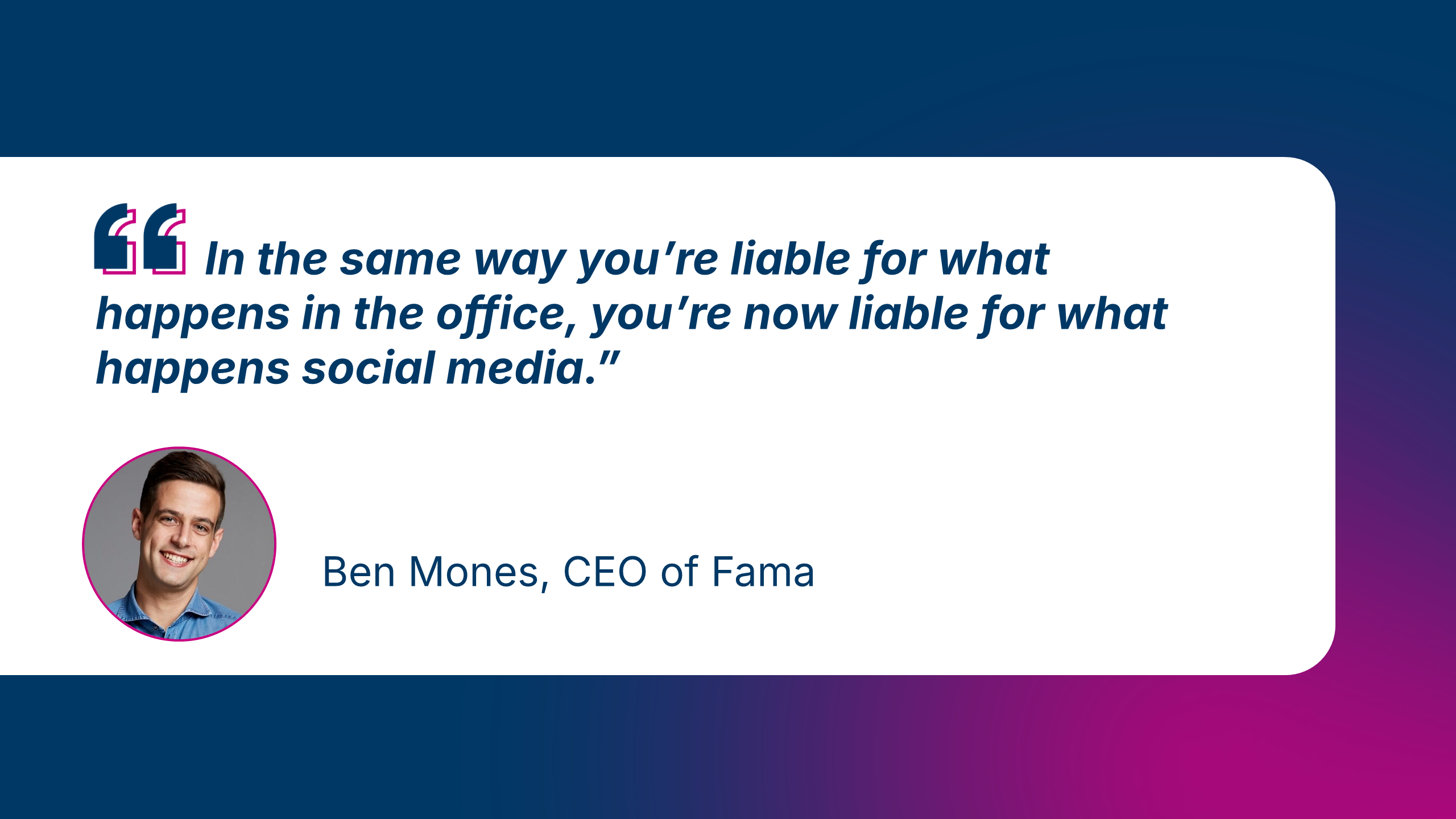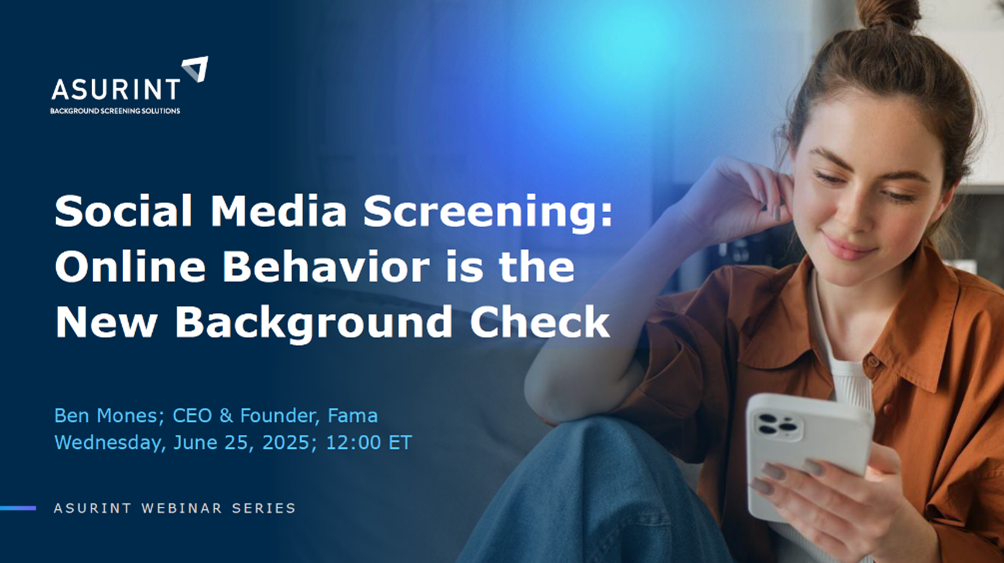Social Media Screening in Recruitment: What HR Leaders Need to Know
5 min read
Published
Oct 08, 2025

We live in a digital world, connected more than ever before. But the lines between personal and professional identity are increasingly blurred. Millennials are on track to make up half the global workforce, while Gen Z workers will account for 30% of the US workforce in the next 5 years. What does all of this mean?
Employers are facing a new frontier in hiring: screening online behavior.
Social media screening has been on the rise, but how can hiring teams approach this unique way of screening compliantly? Ben Mones, CEO and Founder of Fama, shared the growing importance of social media screening and how hiring teams can leverage this type of screening responsibly in a recent webinar hosted by Asurint.
Watch the full webinar here.
Why Social Media Screening Matters
When we think of background checks, generally the focus is on criminal records, employment history, and verifications. However, these checks don’t always reveal how someone may behave in the workplace.
Social media screening offers a new lens that reveals public behavior, values, and potential risks that may not surface in a resume or interview. Ben states, “While it’s easier to get a sense of whether or not someone is qualified for a position, it’s actually much harder to tell if someone is quality or not.”
Employers are increasingly asking questions such as:
- Are they using tools such as ChatGPT during the interview process?
- How does this person act when the interview ends?
- How will this person interact with our coworkers and customers?
Social Media Poses HR Risks
In a survey from Resume Builder, 85% of employers who use social media screening have found social media content that caused them to not hire a candidate. Despite the growing interest in social media screening, Ben cautioned against hiring teams doing it manually.
“It’s time-intensive, inconsistent, and exposes you to legal risk,” he warned. “You can’t unsee protected class information. Once you do, you’ve opened the door to potential discrimination claims.”

In the webinar, he shared a mock Facebook profile to illustrate the point. Within seconds, viewers could identify ethnicity, religion, pregnancy, and military history, which are all protected classes under employment law. Hiring teams may unintentionally (or even intentionally) use one of these details as part of their hiring decision, which is why compliance teams have urged teams to not use social media.
Legal Liability Is Real and Growing
One of the most eye-opening moments of the webinar came when Ben discussed a recent legal case that revolved around social media: Okonowsky v. Garland. The Ninth Circuit Court ruled that employers can be held liable for misconduct that occurs between employees on personal social media channels.
And misconduct is expensive. Each year, companies lose:
- $4.5T to employee theft and fraud
- $59B to intolerance and discrimination (over 5 years)
- $56B to workplace violence
- $2.6B to sexual misconduct
- Between $300-$1,000 per employee on harassment
“In the same way you’re liable for what happens in the office, you’re now liable for what happens on social media,” he said.
The concept of the “misconduct multiplier” was also mentioned, based on a study conducted by Harvard. The study uncovered that one single incident of workplace misconduct can lead to 1.5x more misconduct in an organization. If employees see misconduct and think it’s okay, they’ll start doing it too. This is where legal costs start to balloon and skyrocket, and it can also significantly affect productivity, engagement, and retention of employees.

Enter Behavior Intelligence
To address these challenges, Fama developed an AI-powered solution called Fama Plus, which is integrated into the Asurint platform. This tool provides a comprehensive search of publicly available social media content, including social media posts, web search results, and more, to identify behaviors that align or misalign with a company’s values and policies.
What does social media screening not do?
“We’re not scoring people. We’re not saying who’s good or bad,” Ben clarified. “This isn’t an automated employment decision-making tool. We flag publicly available social media content that matches the criteria you’ve already defined in your employee handbook.”
What Fama Screens For
Employers can customize their screening criteria to include flags such as:
- Threats or harassment
- Intolerance or hate speech
- Violent behavior
- Sexual references
- Criminal activity
- Drug use (excluding cannabis, if desired)
- Trolling or disruptive social media behavior
Most importantly, Fama only reviews publicly available content. Private messages, locked profiles, and political affiliations are off-limits. Fama’s platform is also fully compliant with FCRA, EEOC, GDPR, CCPA, and other global privacy laws. Reports are matched using three identifiers to ensure accuracy, and candidates have the right to dispute findings.
Real-World Impact
We’ve emphasized the need for social media screening, and for good reason. Here are three powerful examples from Fama of how social media screening has made a difference:
- Preventing a Workplace Shooter: A candidate in New York was flagged for threatening executives in a YouTube video. The company had enabled monitoring for violent behavior and threats.
- Identifying a Rogue Doctor: A healthcare organization discovered a doctor selling body parts for research on Twitter.
- Evading a Prejudiced Teacher: A school uncovered a teacher who had posted racist comments about students at a previous job.
Better Protect Your Workplace
As the workforce becomes increasingly digital, employers must evolve their screening strategies. Social media behavior isn’t just a reflection of personal life: it can be a predictor of workplace culture, risk, and brand alignment.
Ben concluded the webinar encouraging organizations to review their policies and screening practices: “Don’t do this on your own, but don’t ignore it either. The signal is there. The risk is real. And the tools exist to help you manage it fairly, consistently, and compliantly.”
To watch the full webinar, click here.
You might also like

Legislative Sessions Heating Up: Fair Chance Laws Remain Focus
State legislatures have been actively addressing a range of key issues, with fair chance laws emerging as a particularly popular focus.

New Mexico Senate Introduces Employment Protections for Medical Marijuana Users
The New Mexico Senate introduced SB 129, “Adverse Employment Action & Cannabis”.

Third Circuit Finds Pennsylvania’s Criminal Records Law Applies to Self-Disclosures
Employers hiring in Pennsylvania should take note of a recent court ruling from the U.S. Court of Appeals for the Third Circuit.


